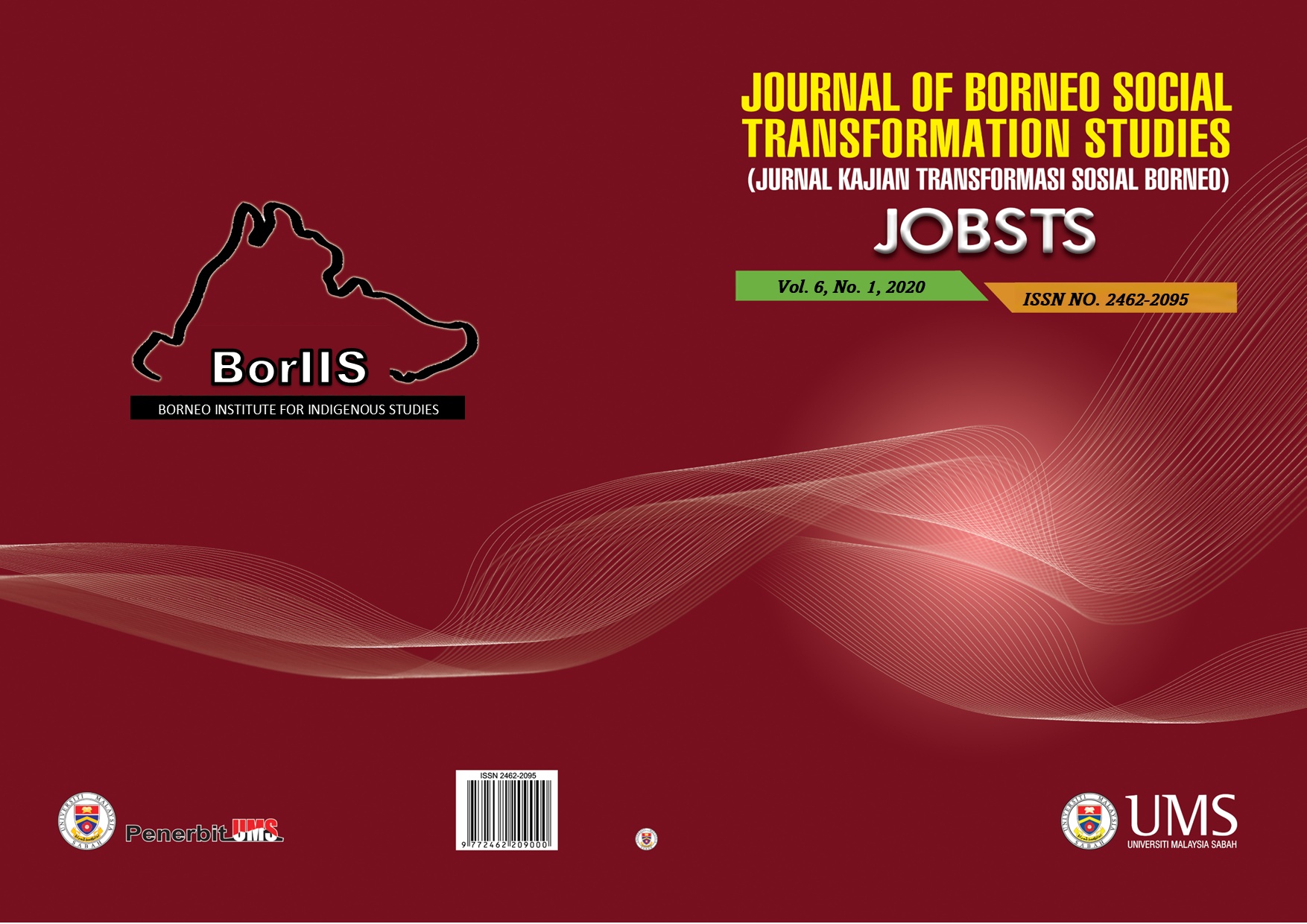IMPAK PENUBUHAN IMBAK CANYON CONSERVATION AREA (ICCA) KE ATAS KOMUNITI SETEMPAT: KAJIAN KES DI KAMPUNG IMBAK, TONGOD, SABAH, MALAYSIA
THE IMPACT OF IMBAK CANYON CONSERVATION AREA (ICCA) ON LOCAL COMMUNITY: A CASE STUDY OF IMBAK VILLAGE, TONGOD, SABAH, MALAYSIA
DOI:
https://doi.org/10.51200/jobsts.v6i1.2815Keywords:
Kawasan Konservasi Kanyon Imbak (ICCA), Penyertaan Komuniti, Pemuliharaan Alam Sekitar, Kepelbagaian Biologi, Imbak CanyonAbstract
Penglibatan masyarakat dalam kawasan perlindungan merupakan isu kritikal terutama dalam konteks kawasan pemuliharaan alam semulajadi. Kejayaan pembangunan di kawasan perlindungan dan pemuliharaan alam semulajadi adalah sangat penting terutamanya untuk melibatkan penyertaan masyarakat setempat dalam proses membuat keputusan atau komuniti setempat mendapat keuntungan daripada kawasan perlindungan atau pemuliharaan alam semulajadi tersebut. Ini kerana penubuhan Imbak Canyon Conservation Area (ICCA) memberi kesan positif dan negatif kepada masyarakat setempat. Masyarakat setempat di kampung Imbak telah lama tinggal berhampiran di kawasan ICCA sejak dulu lagi. Bagaimanapun, pihak kerajaan Negeri Sabah telah mewartakan Kawasan Imbak Canyon sebagai Hutan Simpan Kelas 1 (Perlindungan) pada tahun 2009. Oleh itu, terdapat beberapa cabaran yang dihadapi oleh masyarakat setempat demi meneruskan amalan dan aktiviti penghidupan harian mereka selama ini yang berasaskan sumber hutan sebelum ICCA ditubuhkan. Kajian ini menggunakan pendekatan kualitatif. Kaedah temu bual mendalam adalah kaedah pengumpulan data yang digunakan; enam orang informan yang terdiri daripada ketua kampung Imbak, penduduk Kampung Imbak dan tiga orang penduduk kampung yang bekerja sebagai kakitangan di kawasan Pemuliharaan Imbak Canyon telah ditemu bual. Dapatan kajian menunjukkan bahawa terdapat kesan positif penubuhan ICCA ke atas ahli komuniti setempat sebagai hasil daripada penglibatan mereka dalam aktiviti ekopelancongan seperti menjadi penyedia inap desa di ICCA. Oleh itu, hasil kajian ini diharapkan dapat memberikan sumber data lapangan kepada pihak berkepentingan untuk mempertimbangkan kebijakan pembangunan alam semulajadi yang disebut sebagai pendekatan pemuliharaan berasaskan komuniti di ICCA.
Community involvement in a conservation area has become a critical issue especially in the context of a nature conservation area. The success of the development in the conservation area is essential to involve local community participation either in the process of decision-making or the local community is gains advantages benefits brought about by the conservation area. This is because the establishment of the Imbak Canyon Conservation Area (ICCA) has a positive and negative impact on the local community. The local community of Imbak village has been stayed in nearby areas for a long time ago. The Sabah State government, however, gazette Imbak Canyon as a Class 1 (Protection) Forest Reserve in 2009. Thus, there are some challenges faced by the local community to sustain their daily livelihoods practices and activities of which were based on forest resources used before the ICCA was established. This study applied a qualitative approach. An in-depth interview of the data collection method was used; six informants comprising the village chief of Imbak, residents of Kampung Imbak, and three other villagers are working for staff at the Imbak Canyon Conservation Area were interviewed. The research findings show that there is also a positive impact attained by the local community as a result of their involvement in ecotourism activities such as become as homestay providers in the ICCA. Therefore, the results of this study will hopefully provide some grounded data for the stakeholder to consider the policy of so-called the community-based conservation approach in the ICCA.
References
Jurnal dan Buku
Agyeman, Y. B., Yeboah, A. O., & Ashie, E. (2019). Protected areas and poverty reduction: The role of ecotourism livelihood in local communities in Ghana. Community Development, 50(1), 73-91
Anthony, B. 2007. The dual nature of parks: attitudes of neighbouring communities towards Kruger National Park, South Africa. Environmental Conservation 34:236–245.
Armitage, D.R., Plummer, R. Berker, F., Arthur, R. I, Charles, A.T., Johmsom, Arthur Hoole. 2008. Community-Based Conservation and Protected Areas in Namibia: Social-Ecological Linkages for Biodiversity. Natural Resources Institute University of Manitoba Winnipeg, Manitoba.






